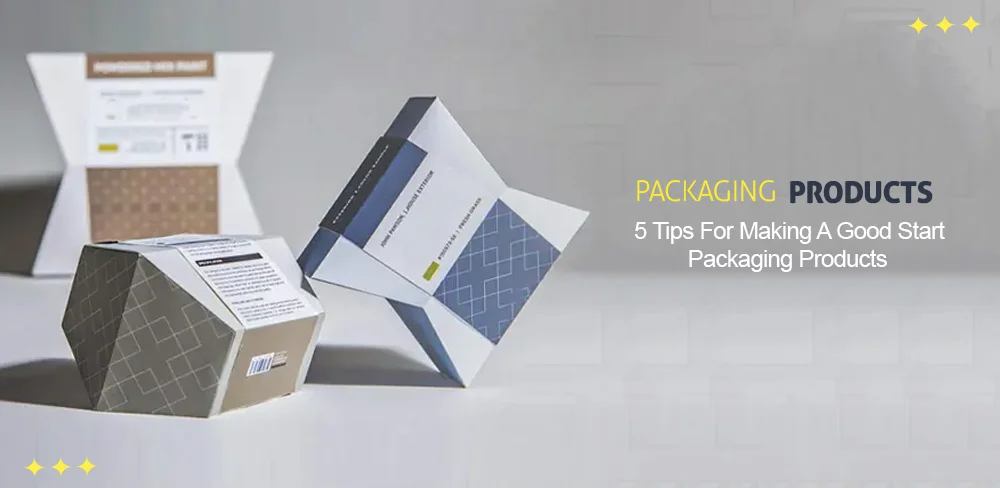Best Nutrients for Big Buds in Deep Water Culture
Grow cannabis, make sure that you are providing yo...

You undoubtedly constantly hunt for ways to hone your packing abilities, just like I do. A strong beginning could spell the difference between success and failure if you're selling a product or starting your own business. Five suggestions for designing functional product packaging will be looked at in this article. From developing a plan to finding the required resources, these recommendations will help you get off to the best possible start.
However, all you really need is a good place to start. People frequently believe that they must start with a comprehensive list of everything they wish to package. Creating a list of potential products to package after thinking about your packaging goals is a fantastic place to start. Think of the initial categories that your products might fit within. Take into account putting fresh produce in containers, such as apples, oranges, strawberries, etc. As soon as you decide what to focus on, begin coming up with potential product ideas.
After developing a few ideas, it's time to test them out and see what the market will accept. Create several straightforward sales pages if you're selling online or through an e-commerce platform to get input on your designs and packaging ideas. And lastly, don't be afraid to try new things! When it comes to product packaging, there is no one perfect way to go about things, so feel free to experiment with different approaches to determine what works best for you and your clients.
When starting out as a package designer, making the right material choices is critical. Each packaging material has unique qualities and benefits, and there are many different types that can be employed.
Paper is one of the most often used materials for packaging. Paper is inexpensive, simple to use, and can be imprinted or engraved with text, logos, or other details. Furthermore, the fact that it is lightweight simplifies storage and transportation. Paper's weakness is that it doesn't shield things from moisture or air pollution very well.
Flexible and rigid containers can be made using PVC film, which is a flexible material. It is also heat-resistant, making it perfect for things like food that will be heated during processing. PVC film's price relative to other materials and inability to be printed or etched with logos or other information are both drawbacks.
Products that need to be sent in bulk but don't need a lot of protection from moisture or air pollution are a fantastic fit for carton boxes. They are also cost-effective because they can be inexpensively printed or engraved with logos or other information.Carton boxes can be hefty, which makes them potentially challenging to ship in quantity if your goods need to travel across large distances.
What form of packaging to employ for a product is a complex issue with no universally applicable solution. Some general advice can, however, help you get off to a good start.
Choosing the material from which your packaging will be produced is the first step in selecting the best type for your goods. Paper, plastic, cardboard, and tin foil are some typical packaging materials. Paper packaging may be recycled numerous times, making it nature's most environmentally friendly choice. It is also lightweight, manageable, and portable. Food can only be preserved on paper for a short period of time before it starts to rot.
One of the most widely utilized types of packaging is plastic packaging. It is sturdy and free of any natural pollutants, making it eco-friendly. Additionally, plastic has great thermal durability, which prevents it from disintegrating even when stored at high temperatures. However, when heated, exposed to moisture, sunshine, or any of these conditions, plastic food containers can release dangerous chemicals.
Although cheap and simple to manufacture, cardboard packaging isn't extremely robust. Foods aren't effectively protected from UV rays or moisture absorption, either.
Making a good first impression when packing products can be challenging, but with some forward planning and straightforward advice, the process can go off without a hitch. It's crucial to measure the product's dimensions and the required packaging before you begin packing anything. This will make it more likely that the item will be delivered securely and in its intended state.
Create a template for the package using cardstock or paper after you know its measurements. Keep track of the direction the product is supposed to open so you can position the opening on the box correctly. Print labels for each side of your packaging type after that (or use digital labels). Be sure to include details like the product name, UPC code, and brand name.
It's finally time to complete all of the necessary fields on your labels. The following are included: a description of the product and its features; a list of its ingredients; usage instructions; and contact details. You'll be well on your way to designing attractive packages that will support the promotion of your items if you stick to these straightforward suggestions!
Grow cannabis, make sure that you are providing yo...
Brazilian wax by Andreia has created a unique conc...
Be careful to read all of the information on the b...
We'll Beat Any Price
Found a better price than ours? We'll beat any price you find.
Live Support
Email, Phone or web chat to help purchasing and more.
Secure Payments
We record and store your preferred method of online payment.
Local Pickup Available
Will Call conveniently available to our customers in Franklin park IL 60131